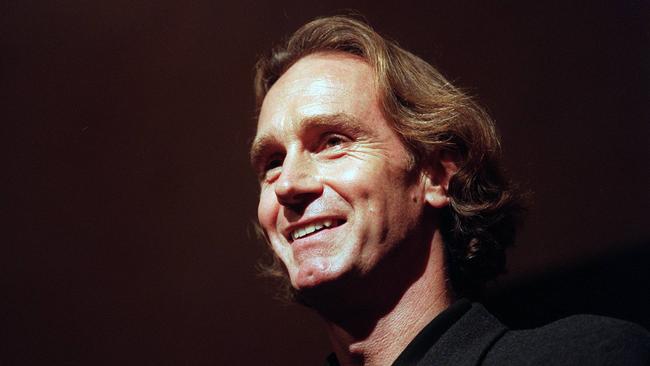Vagaries of the life of Britain’s ‘luckiest man’, The Horse Whisperer author Nicholas Evans
Best-selling novelist Nicholas Evans enjoyed stratospheric success with The Horse Whisperer, but his own life story had dramatic twists too.

Nicholas Benbow Evans, novelist
Born Worcestershire, England on July 26, 1950. Died August 9, age 72
-
When Nicholas Evans finished writing The Horse Whisperer, he could scarcely have imagined it would become one of the most successful novels in the history of publishing.
It was his first novel, published in 1995, dominating the bestseller lists for months, notching up sales of 15 million copies and being translated into 40 languages. On the basis of a few chapters, the film rights were snapped up for $4m by Robert Redford, who went on to produce, direct and star in the 1998 movie, alongside Kristin Scott Thomas and a 14-year-old Scarlett Johansson.
The story concerns a teenage Grace MacLean (Johansson), traumatised by a road accident in which she and a friend are hit by a truck while riding their horses. The friend and her horse are killed, and Grace and her horse, Pilgrim, are both injured, physically and psychologically. In desperation, Grace’s mother, Annie (Scott Thomas), takes her daughter and Pilgrim to the wilds of Montana in search of a wise cowboy, Tom Booker (Redford), celebrated for his mystical talent of being able to communicate with horses – a “horse whisperer”. A strange healing process takes place on his ranch, which changes the lives of both mother and daughter.
“The story’s message is that humans can travel through the bleakest, darkest events – enduring the most awful pain – and still emerge OK, often with the power to see things they might not have before,” said Evans, who had first heard about “horse whisperers” from a blacksmith in Dartmoor, England. Enthralled, he began researching them in libraries, then seeking out practitioners, first in Europe and then in the US
The success of the novel and film meant that Evans, whose precarious financial situation was transformed almost overnight, was able to address large audiences and command large fees for talks about his writing.
Yet audiences would have been equally captivated by the plot of his own life, which would, in a tragic twist in 2008, almost certainly have made for another bestseller. He had picked wild mushrooms on his brother-in-law’s estate in the Scottish Highlands and cooked them in butter and parsley for a meal: the mushrooms, it transpired, were deadly poisonous, and Evans, his brother-in-law and their wives, were left fighting for survival.
While clinging to life and on dialysis, Evans learned each couple’s will granted the other couple custody of their children in the event of the parents’ death. He called his solicitor to urgently draw up new documents and courier them to his bedside. Evans, his wife and her brother were each left without a functioning kidney. In 2011, Evans received a kidney donated by his daughter, Lauren, then 29. His wife received a kidney donated by the mother of her son’s friend.
After leaving school, Evans taught English in Senegal, west Africa before attending Oxford to study law, but chose to enter journalism, much to his father’s displeasure. He worked for three years on a newspaper in Newcastle, then did research for current affairs television before making several TV programs and producing a film for which he also wrote the script, Just Like a Woman (1992), starring Julie Walters.
In 1973, Evans married Jenny Lyon – they met at Oxford – and they struggled to pay their children’s school fees. So he wrote a novel. He sent several chapters to his agent, who sent them on to publishers. A week later the film deal was sealed at that year’s Frankfurt Book Fair. Only his wife was aware he had just been given a diagnosis of cancer and did not even know if he would live another six months, let alone long enough to complete the novel.
The Horse Whisperer transformed his life, but it also brought heartache. His marriage collapsed and he later set up home with Charlotte Gordon Cumming, a singer-songwriter (who wrote the 2001 Sugababes hit, Soul Sound).
Evans followed up his debut novel with The Loop (1998) and The Smoke Jumper (1999), both selling five million copies despite some poor reviews. The Divide (2005) and The Brave (2009) would follow.
All the novels were set in the American West, with which Evans, as a boy, was obsessed.
Newspaper reports had called Evans “the luckiest man in Britain” when he sold The Horse Whisperer. Even after his ordeal in the Scottish Highlands, he held this to be true.
He launched a charity, Give a Kidney – One’s Enough, to encourage people to donate to a stranger on the transplant list. “The whole question of donation, particularly with friends and family, is an immensely complicated emotional and psychological thing,” he told The Guardian. “Some people just can’t bring themselves to even think about it – people who love you, and whom you love, but find it’s just too much … A very close family member who just couldn’t do it came to see us a lot, and would break down in tears, and say: ‘I feel so guilty, I feel so guilty’,. And you just have to keep saying: ‘That’s OK’.” He had grappled with his own “horrible” guilt after the poisoning.
In 2020 Evans, who had the mellifluous voice of an actor and was often likened to Bill Nighy, reflected on the story that made his name. “Usually, writing a novel is like climbing a mountain: it’s slow and arduous and you can easily get lost. But with The Horse Whisperer I could see the story laid out before me, like stepping stones across a river.” It was not a book about horses, he wrote, but about “how easy it is for all of us to get lost and clouded and separated from the things that really matter”.
The Times


